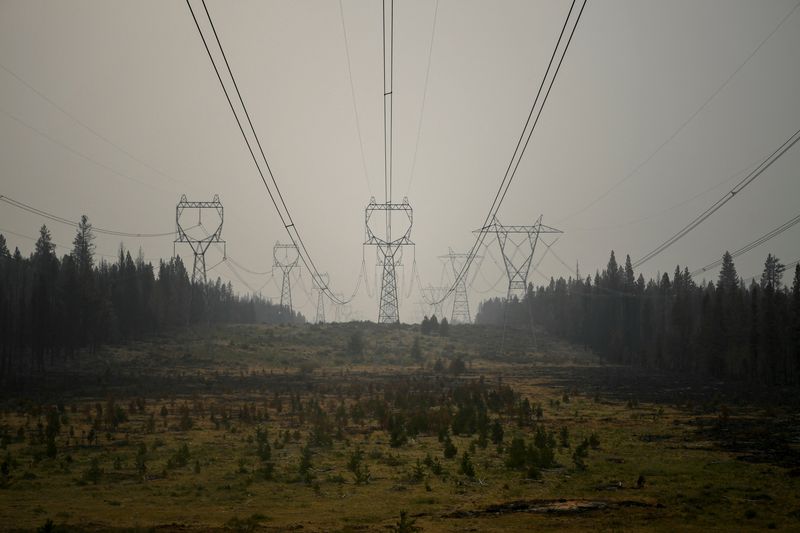Stock Markets
Analysis-Warren Buffett’s PacifiCorp utility singed by wildfires

By Jonathan Stempel
OMAHA, Nebraska (Reuters) – Two years ago, Warren Buffett branded Berkshire Hathaway (NYSE:)’s energy business one of his conglomerate’s four “giants.” Now he fears its business model may be broken.
Berkshire Hathaway Energy’s PacifiCorp unit faces billions of dollars in potential liabilities from wildfires that have scorched hundreds of thousands of acres in southern Oregon and northern California.
Costs could rise as more fires break out, and from efforts to prevent them. Climate change, reflected in drier and hotter weather and more combustible vegetation, adds to the risks.
“I did not anticipate or even consider the adverse developments in regulatory returns,” Buffett wrote in his annual shareholder letter in February. “I made a costly mistake in not doing so.”
What remains unclear is the extent PacifiCorp’s problems drag on the conglomerate’s overall results, with Berkshire’s deep balance sheet and dozens of other operations being unable to totally counteract.
Buffett, 93, and his designated successor Greg Abel, 61, may face shareholder questions at Berkshire’s May 4 annual meeting in Omaha, Nebraska, about their concerns for the energy company.
“Wildfires make (the utilities) fire insurance companies on top of being utilities,” said Steven Check, who oversees $1.9 billion at Check Capital management, including $600 million in Berkshire stock and options. “It is a material change. Warren Buffett did not see this coming at all.”
ESCALATING CLAIMS
Berkshire Hathaway Energy serves about 5.3 million electric and gas customers through PacifiCorp, MidAmerican Energy and NV Energy in 11 western and Midwestern states, and millions more in England and Alberta, Canada.
remove ads
.
It owns 36,400 miles (58,580 km) of electric transmission lines, and operates 21,000 miles of pipelines.
For many years, Berkshire Hathaway Energy – which is 92% owned by Berkshire Hathaway – had been a steady earnings engine for its parent, typically generating 10% to 12% of overall operating profit.
That fell to just 6% in 2023, as the business’s profit slid 40% to $2.33 billion.
PacifiCorp was a big reason. Jurors have found the Portland, Oregon-based utility liable in several verdicts over wildfires from 2020, blaming losses on its power lines. PacifiCorp has denied negligence.
But it ended 2023 with $2.4 billion of projected wildfire losses, and has said losses could grow to $8 billion.
This week, a group of 1,000 fire victims said PacifiCorp should pay them $30 billion.
One result: PacifiCorp will pay no dividends to Berkshire Hathaway Energy for several years, which could affect the parent’s ability to fund operations.
“It’s key for utilities to recover costs and maintain a strong financial profile so they can ensure reliability for customers,” said Travis Miller, a Morningstar stock analyst.
Utilities can reduce the risk of wildfires by insulating wires to reduce the threat of sparks, trimming or cutting down trees that could contact power equipment, burying transmission lines underground, and temporarily shutting off power.
But mitigation can be expensive, and Buffett pledged that Berkshire “will not knowingly throw good money after bad.”
Toby Shea, senior credit officer at Moody’s (NYSE:) Investors Service, explained: “He’s saying, look, if we basically have to pay out billions and billions of dollars every time there is a big fire, this is not a workable model.”
remove ads
.
BLAME THE LAWYERS This is not the first time Berkshire has encountered big headwinds in a major business.
Berkshire spent years cleaning up poor underwriting at General Re after paying $16 billion for the reinsurer in 1998.
It also overpaid for Precision Castparts, which cost $32.1 billion in 2016, only to see its aircraft parts business collapse during the pandemic. Litigation involving PacifiCorp could drag out for years, and the ultimate cost and timing of payouts are uncertain.
In his shareholder letter, Buffett warned that a “confiscatory resolution” might befall PacifiCorp, but that Berkshire and Berkshire Hathaway Energy were structured to survive it.
Though analysts do not foresee a bankruptcy, Berkshire could decide it might not be worth investing in generating and transmission assets if it were forced to foot several years of big legal bills.
“Our assumption is that if damages at PacifiCorp become unsustainable long term, the company’s support toward PacifiCorp could be limited,” S&P Global analyst Sloan Millman said.
Berkshire Hathaway Energy declined to comment for this article.
PacifiCorp said the $30 billion claim shows the need for legal reform, with its ability to serve customers “threatened by excessive wildfire damages pursued by plaintiffs’ attorneys who have a substantial financial stake in these outcomes.”
Some states are addressing utilities’ risk of bankruptcy from wildfires.
In 2019, California lawmakers created a multibillion-dollar wildfire fund that utilities could tap to pay for damages caused by their equipment.
And in March 2024, Utah lawmakers allowed large utilities to collect surcharges from customers to establish wildfire funds, and capped liability on some claims.
remove ads
.
PacifiCorp could benefit if Oregon took similar steps. For now, Berkshire’s size offers protection from big losses.
Paul Lountzis, president of Lountzis Asset Management in Wyomissing, Pennsylvania, which invests 11% of its assets in Berkshire stock, said diversification “really, really helps. It’s not like Berkshire is one singular utility.”
Stock Markets
Suburban Propane director Logan sells $139k in shares
Stock Markets
Stock market today: S&P 500 closes lower, but posts big weekly win
Stock Markets
TD Bank promotes Laura Nitti to retail market president role

 Forex3 years ago
Forex3 years agoForex Today: the dollar is gaining strength amid gloomy sentiment at the start of the Fed’s week

 Forex3 years ago
Forex3 years agoUnbiased review of Pocket Option broker

 Forex3 years ago
Forex3 years agoDollar to pound sterling exchange rate today: Pound plummeted to its lowest since 1985

 Forex3 years ago
Forex3 years agoHow is the Australian dollar doing today?

 Cryptocurrency3 years ago
Cryptocurrency3 years agoWhat happened in the crypto market – current events today

 World3 years ago
World3 years agoWhy are modern video games an art form?

 Commodities3 years ago
Commodities3 years agoCopper continues to fall in price on expectations of lower demand in China

 Economy3 years ago
Economy3 years agoCrude oil tankers double in price due to EU anti-Russian sanctions

























